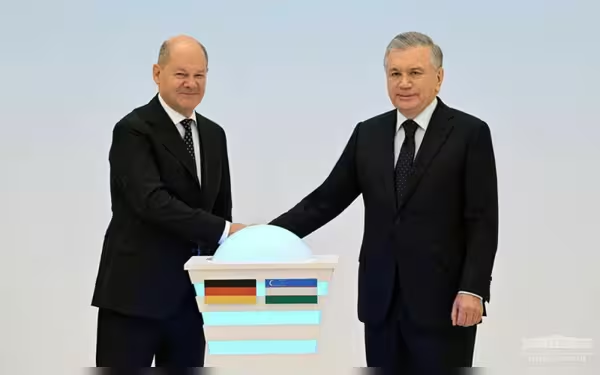Saturday, November 16, 2024 07:30 PM
Scholz Visits Uzbekistan to Secure Energy Resources
- Scholz emphasizes developing Uzbekistan's natural resources.
- Concerns raised over trade ties with Russia.
- Human Rights Watch urges advocacy during the visit.
 Image Credits: brecorder
Image Credits: brecorderChancellor Scholz visits Uzbekistan to explore energy resources and strengthen bilateral ties amid global geopolitical shifts.
In recent years, the geopolitical landscape has shifted dramatically, particularly in the context of energy resources. As Europe seeks to reduce its dependence on Russian energy due to the ongoing conflict in Ukraine, countries like Germany are looking towards Central Asia for alternative sources. This shift is exemplified by German Chancellor Olaf Scholz's recent visit to Uzbekistan, where he expressed a keen interest in the country's abundant natural resources.
During his visit to Uzbekistan, Scholz emphasized the importance of "utilising and developing" the vast resources that the Central Asian nation has to offer. Speaking at a roundtable with business leaders in Samarkand, he stated, "We want to jointly utilise and develop the potential of the raw materials that are located here for the benefit of the economies of both countries." This statement underscores Germany's commitment to fostering economic ties with Uzbekistan, which is seen as a promising partner in the region.
Scholz's remarks were met with enthusiasm from Uzbek President Shavkat Mirziyoyev, who highlighted the potential for German companies to play a significant role in developing and exporting Uzbekistan's natural resources. The Uzbek Presidency described this collaboration as a "promising area" for strengthening bilateral relations. This partnership is particularly crucial as both nations navigate the complexities of the global energy market.
However, Scholz's visit was not without its challenges. He addressed concerns regarding the potential for trade ties to inadvertently assist Russia in circumventing international sanctions. "It is good that we regularly exchange information so that trade between us is not used to circumvent rules that apply internationally," he remarked, emphasizing the need for transparency and cooperation in trade practices.
Scholz's trip to Uzbekistan is part of a broader three-day journey that includes participation in a "5+1" summit with Central Asia's five leaders in Kazakhstan. This summit aims to strengthen regional cooperation and address shared challenges. Human Rights Watch has urged Scholz to advocate for improved human rights during his visit, highlighting ongoing issues such as the imprisonment of activists and the lack of free and fair elections in the region.
The significance of Scholz's visit cannot be overstated. It follows similar trips by other European leaders, including French President Emmanuel Macron and former UK Foreign Minister David Cameron, indicating a growing recognition of Central Asia's political and economic importance. As Europe continues to pivot away from Moscow, the region's resources and strategic position are becoming increasingly vital.
Chancellor Scholz's engagement with Uzbekistan marks a pivotal moment in the evolving dynamics of international relations. As countries seek new partnerships and energy sources, the potential for collaboration between Germany and Uzbekistan could pave the way for a more diversified and secure energy future. This visit not only highlights the importance of Central Asia in the global energy landscape but also raises critical questions about human rights and governance in the region. As the world watches, the outcomes of such diplomatic efforts will undoubtedly shape the future of energy and international relations.













